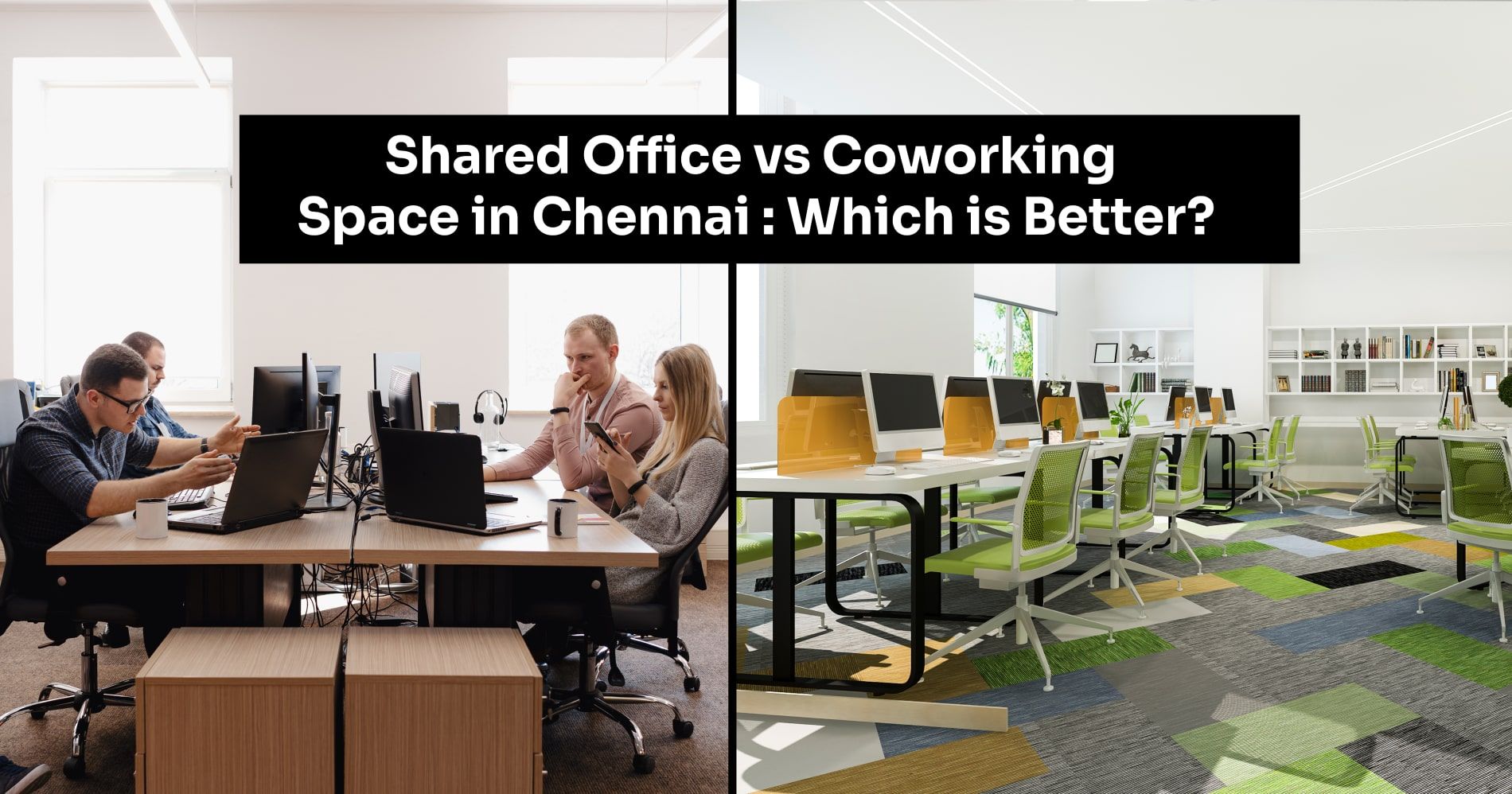In today’s fast-paced business world, the dynamics of workspaces are rapidly evolving. As businesses scale and entrepreneurs launch new ventures, the need for flexible office spaces has grown. In metropolitan cities like Chennai, a large number of options have emerged, offering flexible workspaces that cater to various professional needs. The two most popular choices among professionals are shared office spaces and coworking spaces.
But with so many choices, how do you determine which one best suits your needs? Whether you’re a freelancer, small business owner, startup founder, or even an established company looking to expand or downsize, understanding the differences between shared offices and coworking spaces is crucial.
In this comprehensive guide, we will explore both workspace options, weigh their pros and cons, and help you make an informed decision about which one is better for your business needs in Chennai.
What is a Shared Office?

A shared office refers to a workspace where different businesses or individuals share a common office environment. Typically, these spaces are equipped with essential office infrastructure, such as desks, chairs, internet access, and printers, but are not dedicated to any specific individual or company. The key differentiator is that it offers private office space within a larger shared setting. While you may have your own desk or small office, you share facilities with other businesses.
Shared offices offer a certain level of privacy while still being part of a larger office community. This setup often appeals to businesses that want a balance of flexibility and privacy without the commitment of a traditional office lease.
Key Features of Shared Office Spaces:
- Private offices or desks within a shared environment
- Access to essential office infrastructure (internet, printing, etc.)
- Shared conference rooms and common areas
- Flexible lease terms (typically monthly)
- Lower cost than a dedicated office
Pros of Shared Office Spaces:
- Cost-Efficient: Shared offices generally cost less than renting out an entire office, making them an affordable option for small businesses and startups.
- Privacy: If your work requires privacy but you still want to avoid the long-term commitment of a traditional office, shared offices provide a solution.
- Networking Opportunities: While you may have more privacy than in coworking spaces, you’re still within a community of professionals that can help expand your network.
- Flexibility: Many shared offices offer month-to-month leases, which allows your business to adapt quickly to changing needs.
Cons of Shared Office Spaces:
- Limited Customization: The space is typically less customizable than a private office, as the decor and layout are often pre-determined.
- Limited Interaction: While you’re still in a shared environment, you don’t necessarily have as much interaction with other professionals, which can limit collaboration opportunities.
- Noise Levels: Shared office spaces can get noisy, especially when several businesses or individuals are working in the same room.
What is a Coworking Space?

A coworking space is a type of shared office environment that promotes collaboration and community. These spaces often feature open layouts with flexible seating arrangements and hot desks, encouraging interaction between individuals from different companies and industries. Unlike shared offices, coworking spaces prioritize creating a collaborative environment with the intention of fostering networking, innovation, and synergy among its members.
Coworking spaces usually provide more than just a desk and internet access—they offer additional amenities, such as community events, workshops, and social areas, all designed to encourage collaboration and professional growth.
Key Features of Coworking Spaces:
- Open floor plans with hot desks or dedicated desks
- Shared meeting rooms and collaboration zones
- Networking events and workshops
- Access to amenities like coffee, snacks, and lounges
- A dynamic environment conducive to creativity and interaction
Pros of Coworking Spaces:
- Community and Networking: Coworking spaces foster collaboration between different professionals, making it easier to network and even find business partners or clients.
- Flexibility: Many coworking spaces offer flexible memberships, allowing you to pay for what you need, whether it’s a dedicated desk, hot desk, or a private office.
- Creative and Dynamic Environment: Coworking spaces are known for their vibrant and creative atmosphere, which can inspire new ideas and approaches to business.
- Access to Resources: Many coworking spaces provide valuable resources like mentorship, workshops, and events that can help boost your business.
Cons of Coworking Spaces:
- Less Privacy: Since most coworking spaces feature open layouts, privacy can be limited. This may not be ideal for individuals or teams that need a quiet, isolated environment to focus.
- Noise and Distractions: The collaborative nature of coworking spaces can lead to higher noise levels, which may disrupt concentration and productivity.
- Less Control Over Space: In a coworking space, you’re typically working within a shared area, which means you have less control over how the space is arranged and used.
Key Differences Between Shared Office and Coworking Space

Now that we have a basic understanding of both shared offices and coworking spaces, let’s dive into their differences. Understanding these distinctions will help you decide which workspace is more suited to your business.
1. Privacy:
- Shared Office: Shared offices offer more privacy than coworking spaces. You get your own private office or desk, allowing you to close the door when needed.
- Coworking Space: Coworking spaces tend to have open layouts, making privacy more limited. While some coworking spaces offer private offices, most involve shared, open areas.
2. Cost:
- Shared Office: Shared office spaces are generally more affordable than private offices, but they tend to be more expensive than coworking spaces. The cost can vary based on location, size, and the level of privacy.
- Coworking Space: Coworking spaces are typically more budget-friendly, especially for freelancers or small teams. Memberships can be flexible and scalable based on your needs.
3. Flexibility:
- Shared Office: Shared offices provide flexibility in terms of lease duration. You can choose month-to-month or longer contracts depending on your business needs.
- Coworking Space: Coworking spaces are highly flexible with various membership plans, such as hot desks (pay per day), dedicated desks (assigned space), and private offices.
4. Community:
- Shared Office: While shared offices allow you to interact with other professionals, the focus is on privacy rather than community. There is less interaction compared to coworking spaces.
- Coworking Space: Coworking spaces thrive on community and collaboration. You are encouraged to network and engage with others, creating opportunities for partnerships and business development.
5. Amenities:
- Shared Office: Shared offices provide basic amenities, such as high-speed internet, printers, and meeting rooms. Some may also offer extras like coffee, but amenities are usually limited.
- Coworking Space: Coworking spaces offer a wider range of amenities, including community events, workshops, and access to professional development resources. These spaces often come with additional perks like free snacks, beverages, and even fitness centers.
6. Work Environment:
- Shared Office: Shared offices tend to offer a more formal, traditional work environment with fewer distractions. It’s more suitable for businesses that need focused work and less social interaction.
- Coworking Space: Coworking spaces are vibrant, collaborative, and informal. The work environment is ideal for those who thrive in creative and social settings.
Which is Better for Your Business in Chennai?

When choosing between a shared office or a coworking space in Chennai, several factors need to be considered:
- Type of Business: If your business requires privacy, confidentiality, or specific tools and equipment, a shared office may be the better option. On the other hand, if your work is creative or collaborative, or if you’re looking to network with like-minded professionals, a coworking space could be more beneficial.
- Budget: If you have a limited budget and need flexibility, coworking spaces in Chennai often offer more affordable solutions. Shared offices can be pricier but offer more privacy, which may be worth the extra cost.
- Company Size: Small businesses or freelancers may find coworking spaces ideal because of the opportunities for networking and flexibility. Larger teams or companies with confidential work may lean toward shared office spaces.
- Work-Life Balance: If your business values a healthy work-life balance and a sense of community, coworking spaces provide more opportunities for social engagement and collaboration, potentially helping reduce work-related stress.
Conclusion
In Chennai, both shared offices and coworking spaces offer unique advantages and are great options for businesses looking for flexible, cost-effective office solutions. Shared offices tend to provide more privacy and are suited for businesses that prioritize quiet and independent work. On the other hand, coworking spaces are perfect for startups, freelancers, and businesses looking to network, collaborate, and work in a more dynamic and vibrant environment.
The key to making the right choice lies in understanding your business needs—whether it’s privacy, community, flexibility, or cost-effectiveness. By evaluating these factors, you’ll be able to find the ideal workspace in Chennai that best fits your business goals.









